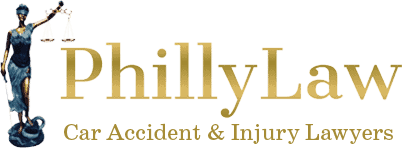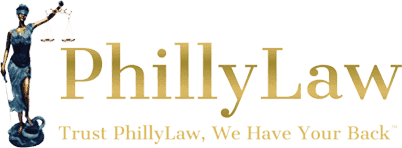Common Types of Car Accidents in Pennsylvania
In Pennsylvania, car accidents can occur in several common forms, each with its own set of causes, consequences, and legal implications. If you have been injured, the car accident attorneys at PhillyLaw can provide a free consultation to learn more about your ability to recover for your accident-related expenses.
Some common types of car accidents include:
Rear-end Collision
Rear-end collisions often result from one vehicle following another too closely or sudden braking, leading to the following vehicle crashing into the one in front.
Side-impact Collision
Also known as T-bone accidents, these types of car accidents occur when one vehicle strikes the side of another. These are common at intersections and can result from failing to yield, running stop signs, or red lights.
Head-on Collision
Head-on collisions happen when the fronts of two vehicles collide. These vehicle crashes are often the result of wrong-way driving, driving under the influence, or veering across the road centerline. Head-on collisions can result in severe injuries or fatalities.
Single-Vehicle Crashes
A single-car accident involves only one vehicle and can include hitting a tree, slipping off the road, or colliding with debris. Factors such as weather, road conditions, or driver distraction often play a crucial role in single-vehicle accidents.
Multi-Vehicle Pile-ups
Typically occurring on highways or at high speeds, these involve three or more vehicles and can be particularly hazardous, causing chain-reaction crashes with multiple vehicles involved.
Vehicle Rollover Accident
Rollover accidents involve a vehicle flipping over onto its side or roof. The dynamics of a rollover are complex, often triggered by sharp turns at high speeds, collisions, or interaction with soft roadside shoulders. Sport utility vehicles (SUVs) and taller cars are particularly susceptible due to their higher center of gravity.
Vehicle Ejection
Ejections occur when an occupant is thrown from the vehicle during a crash, typically as a result of not wearing a seatbelt. These incidents can result in particularly severe injuries or fatalities as the individual is unprotected from external impacts.
Animal Collisions
Especially relevant in areas with significant wildlife, collisions with animals can cause substantial vehicle damage and lead to loss of control, resulting in further accidents. Deer are common culprits in many regions, leading to significant risk for drivers, particularly during mating season.
Pedestrian and Cyclist Accidents
When vehicles collide with pedestrians or cyclists, the results can be devastating due to the vulnerability of these road users. Such accidents often stem from drivers failing to yield, distractions, or poor visibility.
Sideswipe Collision
Sideswipe collisions typically occur when two parallel vehicles touch sides, often as a result of one vehicle unintentionally drifting into another lane. These accidents are common on multi-lane roads and can be caused by distraction, failure to check blind spots before changing lanes, or the effects of inclement weather impacting visibility or road grip. While sideswipe collisions can sometimes result in relatively minor vehicle damage, they have the potential to cause significant accidents by forcing a driver off the road or into the path of oncoming traffic.
Understanding the nuances and typical causes of these accidents is crucial in developing preventative measures and ensuring the safety of all road users.
Rideshare Accidents
Rideshare accidents involve vehicles operating under services like Uber and Lyft. These accidents can become complex due to the involvement of multiple parties, including the rideshare company, the driver, and any other involved vehicles. Legal considerations for rideshare accidents may differ from traditional car accidents, given the unique employment status of rideshare drivers and the insurance policies in play.
Delivery Vehicle Accidents
With the rise of online shopping, delivery vehicle accidents have become increasingly common. These accidents involve vehicles from companies like Amazon, DoorDash, GrubHub, and other delivery services. The pressures of tight schedules and long hours on the road often contribute to these incidents. Factors leading to delivery vehicle accidents include driver fatigue, improper vehicle maintenance, distracted driving, and the challenge of navigating residential areas. Legally, these accidents can be complex due to the corporate ownership of the vehicles and the employment status of the drivers.
Common Causes of Motor Vehicle Accidents
Myriad factors contribute to the different types of car accidents, some within the control of drivers and others external. Identifying these causes is essential for the prevention of car accident injuries and enhancing road safety. Here are the common causes:
Distracted Driving
One of the leading causes of car accidents today, distracted driving encompasses any activity that diverts attention from driving. This includes driver inattention due to phone use, eating, using navigation systems, or any action that takes the driver’s focus off the road.
Speeding
Driving above the speed limit or too fast for road conditions reduces a driver’s reaction time and increases the severity of an accident. Speeding continues to be a significant contributor to both minor and deadly crashes.
Driving Under the Influence
Operating a vehicle under the influence of alcohol, drugs, or any substance impairing cognitive and motor functions is a major cause of accidents. Such substances dramatically reduce a driver’s ability to make sound judgments and react timely to road situations.
Weather Conditions
Adverse weather conditions such as rain, snow, ice, fog, and even high winds can create hazardous driving conditions. Slippery roads and reduced visibility contribute to accidents where drivers may lose control of their vehicle.
Running Red Lights and Stop Signs
When drivers fail to heed traffic signals and signs, this can lead to severe accidents, especially at intersections where the risk for side-impact collisions is high. These violations usually result from impatience or a lack of attention.
Failure to Yield the Right of Way
Failure to yield, especially at intersections, merging lanes, and pedestrian crossings, is a common cause for accidents involving vehicles, cyclists, and pedestrians.
Reckless Driving
Reckless driving, including aggressive behaviors like tailgating, erratic lane changing, and disregarding traffic conditions, poses a significant danger to everyone on the road.
Driver Fatigue
Driving while tired can be as dangerous as driving under the influence of alcohol. Fatigue impairs reaction times and decision-making capabilities, leading to a higher probability of accidents.
Poor Road Conditions
Poorly maintained roads, lacking visible signs, improper designs, potholes, unsafe construction areas, and inadequate lighting can lead to vehicle damage and accidents.
Vehicle Defects
Manufacturing defects or failure to maintain vehicle safety through regular checks can lead to malfunctions like brake failure, tire blowouts, or steering issues, causing accidents.
Road Rage
Road rage, characterized by aggressive or violent behaviors stemming from a driver’s uncontrolled anger towards other road users, is a significant cause of car accidents. This may involve yelling, gesturing aggressively, intentionally blocking other vehicles, tailgating closely to intimidate, or even purposeful collisions. Such actions not only endanger the individuals directly involved but also potentially harm innocent bystanders by escalating conflicts that can lead to severe accidents.
Understanding these common causes helps in formulating strategies for road safety education, law enforcement, and infrastructure improvements to reduce the occurrence of car accidents.
Typical Serious Injuries from a Car Accident
Auto accidents can result in a wide range of injuries, from minor bruises to life-threatening conditions. The severity and type often depend on the nature of the accident, the speed of the vehicles involved, and whether the occupants were wearing seatbelts. Here are some of the most common injuries:
Whiplash
A common car accident injury in rear-end collisions, whiplash occurs when the head is suddenly jerked back and forth, stretching and tearing the muscles and tendons in the neck.
Broken Bones
The force of a car crash can easily break bones, with the ribs, arms, legs, and pelvis among the most commonly fractured.
Traumatic Brain Injuries (TBI)
A head injury can result in a TBI, impacting a person’s cognitive functions, physical abilities, or emotional state. Concussions are a mild form of TBI often seen in car accidents.
Spinal Cord Injuries
Injuries to the spinal cord can cause significant nerve damage, potentially leading to paralysis (either partial or complete) or other chronic conditions.
Lacerations and Bruises
Sharp objects, broken glass, seat belts, airbags, or the sheer force of impact can cause cuts and bruises, which, while generally less severe, can still lead to significant blood loss or infection.
Internal Injuries
The impact can cause internal bleeding or damage to internal organs, which might not be immediately apparent but can be life-threatening if not treated promptly.
Psychological Trauma
Beyond physical injuries, car accidents can leave lasting psychological impacts, including PTSD, anxiety, and depression, which can significantly affect one’s quality of life.
Understanding these injuries underscores the importance of road safety practices and the crucial role of emergency medical services following an accident. Early diagnosis and treatment are paramount in preventing long-term disabilities and facilitating recovery.
Types of Damages for Car Accident Cases
In the wake of a car accident, victims often face a multitude of damages, which can be broadly categorized into economic, non-economic, and sometimes punitive damages. Understanding these categories is crucial for anyone involved in a car accident case, as they form the basis of compensation claims.
Economic Damages
Economic damages are quantifiable losses that the victim has suffered due to the accident. These include:
- Medical Expenses: Costs for immediate medical treatment, rehabilitation, and future medical care related to the injuries sustained.
- Lost Wages: Compensation for the income lost while the victim was unable to work due to their injuries.
- Property Damage: The cost of repairing or replacing the vehicle and any other personal property damaged in the accident.
- Out-of-Pocket Expenses: Other expenses incurred as a result of the accident, such as towing charges, rental car costs, and the purchase of medical supplies.
Non-Economic Damages
Non-economic damages compensate the victim for non-monetary losses related to the accident, which are more subjective and can vary significantly from one case to another. These include:
- Pain and Suffering: Compensation for the physical pain and emotional distress experienced as a result of the injuries.
- Loss of Consortium: Damages awarded for the negative impact on the victim’s relationship with their spouse or partner due to the injuries.
- Loss of Enjoyment of Life: Compensation for the reduction in the victim’s ability to enjoy daily activities and life experiences.
- Mental Anguish: Compensation for psychological effects such as depression, anxiety, and PTSD resulting from the accident.
Punitive Damages
Punitive damages are not awarded in every case, as they are intended to punish the at-fault party for particularly reckless or malicious behavior and to deter similar conduct in the future. Unlike economic and non-economic damages, which are compensatory, punitive damages are more about penalizing the wrongdoer.
The calculation and awarding of these damages involve complex legal considerations and vary widely by jurisdiction. Victims seeking compensation are advised to consult with experienced legal professionals to ensure a comprehensive understanding and to maximize their recovery.
An Experienced Car Accident Attorney at PhillyLaw Will Help You Pursue Compensation for Your Injuries
At PhillyLaw, our experienced car accident lawyers understand the complexities of car accident cases and are committed to helping you pursue the at-fault driver responsible for your injuries. We meticulously gather evidence, consult with experts, and utilize our in-depth knowledge of traffic laws to build a strong case on your behalf. Our goal is to ensure that you receive full and fair compensation for your car accident caused by another driver’s negligence, which includes covering medical expenses, lost wages, and compensation for pain and suffering. Trust the PhillyLaw legal team to advocate fiercely for your rights and guide you through every step of the legal process with dedication and personalized attention. Call us today for a free consultation.

